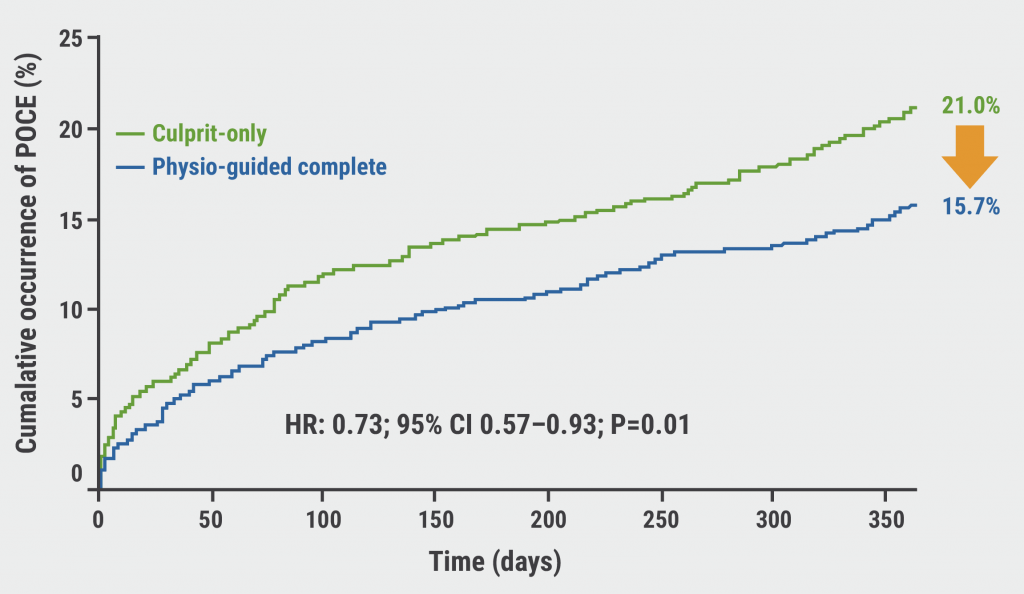https://doi.org/10.55788/b3369b03
Dr Robert Mentz (Duke University, NC, USA) outlined that the AFFIRM-AHF and IRONMAN trials, as well as meta-analyses, indicated that intravenous iron reduces the risk of HF hospitalisations without a significant effect on mortality [1–3]. “More evidence is needed with respect to the effect of FCM on clinical outcomes.” The multicentre, double-blind, phase 3 HEART-FID trial (NCT03037931) randomised 3,065 participants with HFrEF and iron deficiency 1:1 to intravenous FCM or a placebo [4]. The primary endpoint was a hierarchical composite of all-cause mortality at 12 months, HF hospitalisations at 12 months, and change in 6-minute walking distance (6MWD) at 6 months.
The primary endpoint was not significantly different at the significance threshold that was pre-specified for the trial (P=0.019). The corresponding rates for the individual aspects of the primary endpoint were:
- all-cause mortality at 12 months: FCM 8.6% versus placebo 10.3%;
- HF hospitalisations at 12 months: FCM 13.3% versus placebo 14.8%; and
- change in 6MWD at 6 months: FCM +8 metres versus placebo +4 metres.
Treatment-emergent adverse event rates were similar in participants receiving FCM and those receiving placebo (27.0% vs 26.2%).
Despite its neutral results, the presenting author stated, “The HEART-FID trial is the largest study to evaluate the long-term safety and efficacy of intravenous FCM in patients with HFrEF and iron deficiency.” “FCM showed an acceptable safety profile and led to a modest, albeit non-significant, improvement in the primary endpoint.”
- Ponikowski P, et al. Lancet. 2020;396(10266):1895–1904.
- Kalra PR, et al. Lancet. 2022;400(10369):2199–2209.
- Ponikowski P, et al. Impact of ferric carboxymaltose (FCM) on heart failure-related clinical outcomes in patients with heart failure and iron deficiency: an individual participant data meta-analysis. Hot Line Session 2, ESC Congress 2023, 25–28 August, Amsterdam, the Netherlands.
- Mentz RJ, et al. The HEART-FID trial: efficacy and safety of ferric carboxymaltose as treatment for heart failure with iron deficiency. Hot Line Session 2, ESC Congress 2023, 25–28 August, Amsterdam, the Netherlands
Copyright ©2023 Medicom Medical Publishers
Posted on
Previous Article
« Heart failure: the 2023 update Next Article
No benefit of extracorporeal life support in MI plus cardiogenic shock »
« Heart failure: the 2023 update Next Article
No benefit of extracorporeal life support in MI plus cardiogenic shock »
Table of Contents: ESC 2023
Featured articles
How to manage arterial thrombosis and thromboembolism in COVID-19?
2023 ESC Guidelines & Updates
Heart failure: the 2023 update
Guidelines for Acute Coronary Syndrome
Guidelines for the management of cardiomyopathies
Cardiovascular disease and diabetes: new guidelines
Guidelines for the management of endocarditis
Trial Updates in Heart Failure
Traditional Chinese medicine successful in HFrEF
CRT upgrade benefits patients with HFrEF and an ICD
Catheter ablation saves lives in end-stage HF with AF
Meta-analysis: Does FCM improve clinical outcomes in HF?
HEART-FID: Is intravenous ferric carboxymaltose helpful in HFrEF with iron deficiency?
Natriuresis-guided diuretic therapy to facilitate decongestion in acute HF
DICTATE-AHF: Early dapagliflozin to manage acute HF
STEP-HFpEF: Semaglutide safe and efficacious in HFpEF plus obesity
Key Research on Prevention
Does colchicine prevent perioperative AF and MINS?
Diagnostic tool doubles cardiovascular diagnoses in patients with COPD or diabetes
Inorganic nitrate strongly reduces CIN in high-risk patients undergoing angiography
Finetuning Antiplatelet and Anticoagulation Therapy
Should we use anticoagulation in AHRE to prevent stroke?
Results of FRAIL-AF trial suggest increased bleeding risk with DOACs
The optimal duration of anticoagulation therapy in cancer patients with DVT
DAPT or clopidogrel monotherapy after stenting in high-risk East-Asian patients?
Assets for ACS and PCI Optimisation
Immediate or staged revascularisation in STEMI plus multivessel disease?
Lp(a) and cardiovascular events: which test is the best?
No benefit of extracorporeal life support in MI plus cardiogenic shock
Functional revascularisation outperforms culprit-only strategy in older MI patients
Can aspirin be omitted after PCI in patients with high bleeding risk?
Angiography vs OCT vs IVUS guidance for PCI: a network meta-analysis
OCTOBER trial: OCT-guided PCI improves clinical outcomes in bifurcation lesions
Other
Minimising atrial pacing does not reduce the risk for AF in sinus node disease
ARAMIS: Can anakinra alleviate acute myocarditis?
Expedited transfer to a specialised centre does not improve cardiac arrest outcomes
Acoramidis improves survival and functional status in ATTR-CM
Related Articles

October 30, 2023
DICTATE-AHF: Early dapagliflozin to manage acute HF
© 2024 Medicom Medical Publishers. All rights reserved. Terms and Conditions | Privacy Policy
HEAD OFFICE
Laarderhoogtweg 25
1101 EB Amsterdam
The Netherlands
T: +31 85 4012 560
E: publishers@medicom-publishers.com

